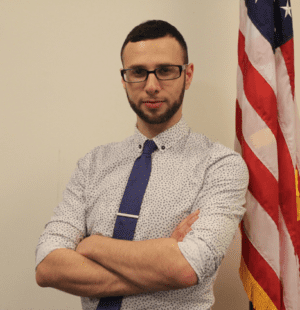This week, YI is highlighting stories about the FAFSA to bring to light why we need to simply the process and make sure students aren’t leaving financial aid funds on the table. The FAFSA is a key tool for students but far too many barriers exist. Follow #FixFAFSA all week to learn more and share your own FAFSA story.
Kevion Ellis
Senior, University of Northern Colorado
 My brother and I are both first-generation students from a lower-middle class family, and we have depended on our Pell Grants and other need-based aid to get us through college. Because our parents are unfamiliar with the FAFSA process, they don’t help either of us when we apply for financial aid each year.
My brother and I are both first-generation students from a lower-middle class family, and we have depended on our Pell Grants and other need-based aid to get us through college. Because our parents are unfamiliar with the FAFSA process, they don’t help either of us when we apply for financial aid each year.
For me, the biggest burden was the financial section of the FAFSA application. Navigating the different income questions, understanding which lines to add together, and where to find the information needed was both frustrating and overwhelming for me. The questions were difficult to understand, and when I asked my parents about their income and tax information, they didn’t understand either. Thankfully, I had a mentor to help me, and we eventually completed the application.
After transferring colleges, I began to work in my new school’s financial aid office. While I understand the FAFSA process better now, I still see students and families every day who don’t. I’m always helping families with inputting income and tax information, navigating the labyrinth of questions, signing the application, solving password trouble, and managing immigration issues, language barriers, and the tedious process of verifying the answers on the forms.
Luckily, I never had to go through verification myself, but I often walk families through the burdensome process of requesting tax transcripts, finding household forms, and submitting W2s. For many, their aid is delayed due to verification issues, and the student has to wait weeks or month before they can afford textbooks and schools supplies, while also running the risk of being dropped from their classes.
I can tell you firsthand that if the FAFSA process was simplified, more students would receive their aid on time and the obstacles of submitting a FAFSA would decrease.
Sara Kragness
Sophomore, Harold Washington College
 My issues for accessing Financial Aid came when I was 23 and applying to return to school after a three year hiatus. During this hiatus I began to file my taxes as independent, and when I was doing my FASFA I assumed I would be able to apply as independent on FASFA as well. During the application process I learned that because I was not yet 24, I was never part of the foster care system, nor was I legally seperated from my parents, I had to file as a dependent. This fact alone was troubling for me.
My issues for accessing Financial Aid came when I was 23 and applying to return to school after a three year hiatus. During this hiatus I began to file my taxes as independent, and when I was doing my FASFA I assumed I would be able to apply as independent on FASFA as well. During the application process I learned that because I was not yet 24, I was never part of the foster care system, nor was I legally seperated from my parents, I had to file as a dependent. This fact alone was troubling for me.
These barriers of not being able to opt-out of the dependent application process and apply as independent (especially when our taxes are filed as such) is putting our education at risk and putting us at an economic disadvantage when we have to wait to continue our education. I think the most logical means of change for this is allowing students who are under 24, but who file taxes independently, to be able to speak with a FASFA representative or to write a supplemental letter explaining our personal situation that can be considered as our applications are processed.
Kyle Brodnick
Junior, Governors State University
 As an independent student with little income, I know firsthand the benefits – and the challenges – of financial aid. Financial aid is a necessary and critically important resource, but I’ve seen obstacles throughout the application process that can be a barrier between students and their ability to afford an education.
As an independent student with little income, I know firsthand the benefits – and the challenges – of financial aid. Financial aid is a necessary and critically important resource, but I’ve seen obstacles throughout the application process that can be a barrier between students and their ability to afford an education.
The challenges with obtaining financial aid can begin as early as the application process itself. When I was applying for financial aid, technical issues with the application left me in the lurch, wondering if my submission had been received. Because unresolved technical difficulties can cause your award to be delayed, I was forced to take several unnecessary trips to the campus financial aid office before we realized the FAFSA website was malfunctioning.
Even if you are approved for financial aid, your application may not be processed before the beginning of the semester, which means your award is late and you could potentially be dropped from your classes because your payment wasn’t processed. This actually happened to several of my peers and me last year, causing a panic on campus. Though my college allowed us to re-enroll in our classes, it was a big source of stress that could have been avoided if the application itself was simpler and information was easier to verify.
Higher education is an investment I am willing to make to pursue my dreams of attending law school. But I know that we can find a solution to make the financial aid process easier to navigate to reduce the financial burden for the students who need it most.
Samer Hassan
Sophomore, Harold Washington College
 As a legal permanent resident, the FAFSA application process has brought me untold anxiety. For years, I watched my friends go to college and wished that I could apply with FAFSA myself – because I had been incorrectly told that I was ineligible for federal financial aid. Only after doing my own research did I realize that I could qualify for the financial aid I needed for my education.
As a legal permanent resident, the FAFSA application process has brought me untold anxiety. For years, I watched my friends go to college and wished that I could apply with FAFSA myself – because I had been incorrectly told that I was ineligible for federal financial aid. Only after doing my own research did I realize that I could qualify for the financial aid I needed for my education.
After starting my application, I faced a series of technical difficulties – the FAFSA system couldn’t find my records – and confusing questions. As someone filling out this application for the first time, I was nervous about entering the information correctly and avoiding any penalties for making a mistake on the forms. I also had to jump through hoops because you can only use the IRS Data Retrieval Tool if you currently live at the same address as when you last filed taxes. Since I had moved that year, I had to pay a $50 fee to get my taxes from the previous year.
On top of all this, I was trying to work full-time, but my job actually made school less affordable. When I was working part-time, I qualified for about $1,200 in aid, but once I started working full-time, I didn’t qualify for any aid at all. The FAFSA requests information about how much money you make, but not about your living expenses. To me, this is the biggest variable that stops students from getting the help they need paying for their education.
Many students today have rent, credit card bills, and other living expenses each month on top of their tuition. We need a federal financial aid system that understands a student’s financial needs are more complex than simply asking about their income without considering their everyday expenses.
